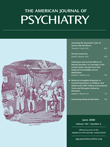Letters to the EditorFull Access
Published Online:1 Jun 2008https://doi.org/10.1176/appi.ajp.2008.07111710
- Cited by
- 17 May 2016 | Social Psychiatry and Psychiatric Epidemiology, Vol. 51, No. 8
- 9 February 2011 | Human Psychopharmacology: Clinical and Experimental, Vol. 26, No. 1
- Pharmacoepidemiology and Drug Safety, Vol. 17, No. 11
Metrics
History
Published online 1 June 2008
Published in print 1 June 2008



